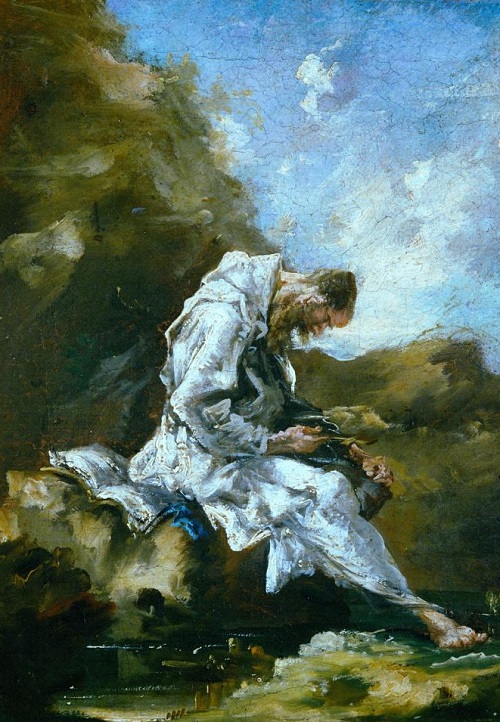FWP:
SETS == BASKIH;
SYMMETRY; WORDPLAY
DESERT: {3,1}
MIRROR: {8,3}
This verse makes good use of the complex possibilities of baskih , which can mean either 'to such an extent' or 'although'; needless to say (this being Ghalib), both senses work excellently with the second line. On the first reading, the speaker is so inactive now that even the thorns lodged in his feet from his old desert-wandering days have now become polish-marks on a mirror-- and his knees, which he no longer uses for any other purpose, have become the mirror itself (1a). On the second reading, even though he's now inactive and reclusive, he still has his souvenirs of the old days of desert-wandering-- but now he makes use of the thorns and of his knees in new ways, to serve new purposes (1b).
Why are the knees like a mirror? Because as the speaker sits passively in a corner, his downcast, lowered gaze is always fixed on them, the way one might gaze into a mirror-- as he contemplates the nature of life, death, madness, and wandering. Why are the thorns like polish-marks? Because they are short lines, violently ground into a surface, and because they both create, and testify to, the proper functioning of that surface. The thorns verify that the mad lover has wandered barefoot in the desert; the polish-marks verify that the mirror has been scraped free of verdigris and highly polished.
And then, through the rule of 'symmetry', there are also two readings of the second line. We can read 'A is B', 'thorns are polish-marks', as everybody does; but we can equally well read 'B is A', 'polish-marks are thorns': even though (or else because) the lover has given up desert-wandering and sits staring at the 'mirror' of his knees and feet, the speaker still feels and remembers, like thorns in his feet, the ordeals and sufferings and wild madness of the road. Perhaps he's now so frail that even looking down at his knees is as painful as wandering barefoot over thorns; or perhaps he's such an incurable desert-wanderer that even when sitting helplessly in a corner he still imagines himself to be traversing a thorny road.
As Faruqi points out, it's not clear whether the lover's abandonment of desert-wandering was deliberate (he no longer wishes to practice it) or took place under some kind of compulsion (he's too worn out for it). And beyond that, we don't know whether the verse exults in this new condition (he now seeks inner insight instead of mere outer vistas), grieves over it ('Alas, I can no longer wander-- I'm left with nothing to contemplate but my own face!'), or simply reports it neutrally, as another development in life.
Then, the 'to me' at the end calls the whole thing into question-- would anybody else agree with him? Or is the speaker simply making up a fantasy of some kind, to console himself or rationalize his behavior?
There's also a crazed or playful aspect of sheer hyperbole (and of course wordplay) in the impossibly contorted-sounding position of the speaker's knees and feet. Is he sitting? Or squatting? Or cross-legged? Or seated do-zānū (see {32,2})?) Such a position might be similar to the hunched-over one also imagined-- equally extravagantly-- in {171,1}. Needless to say, Ghalib himself probably didn't even bother to sort out the exact nature of such implausibly weird positions; he was after wordplay and meaning-play, not anatomical accuracy. It's still fun to speculate, but it's irrelevant fun.
In any case, the speaker is now so immobile (through meditation or despair) that his head and eyes are always cast down to the maximum degree possible. As he looks down, his knees are (literally or metaphorically) so close to his feet that they seem to be joined or assimilated with them, since the thorns in the feet can appear as polish-marks in the mirror of the knees. And his gaze is so fixed downward that he stares absorbedly at his knees the way people look into a mirror. Too much elaborate interpretive work, for too little reward; I almost agree with Nazm.
Note for grammar fans: Faruqi observes, in effect, that what looks to be the present progressive '[I] am becoming' [ho rahā hūñ] could also be read as '[I] became, and have remained' [ho kar rahā hūñ , with the kar colloquially omitted], though he explains these forms in other idiomatic terms. He then discusses the somewhat different implications of the two readings. For more on this idiomatic pattern, including examples, see {58,7}. Certainly the present progressive reading is so completely obvious and natural that the possibility (or desirability?) of another reading never even occurred to me until I read Faruqi's commentary. In any case, in this highly abstract verse it doesn't really seem to make much difference.

Nazm:
That is, when the feet are brought close to the knees, the thorns that are lodged in the feet have become the polish-marks of the mirror of the knees. In this verse too, except for the simile, there's no pleasure in the meaning. (192)
== Nazm page 192